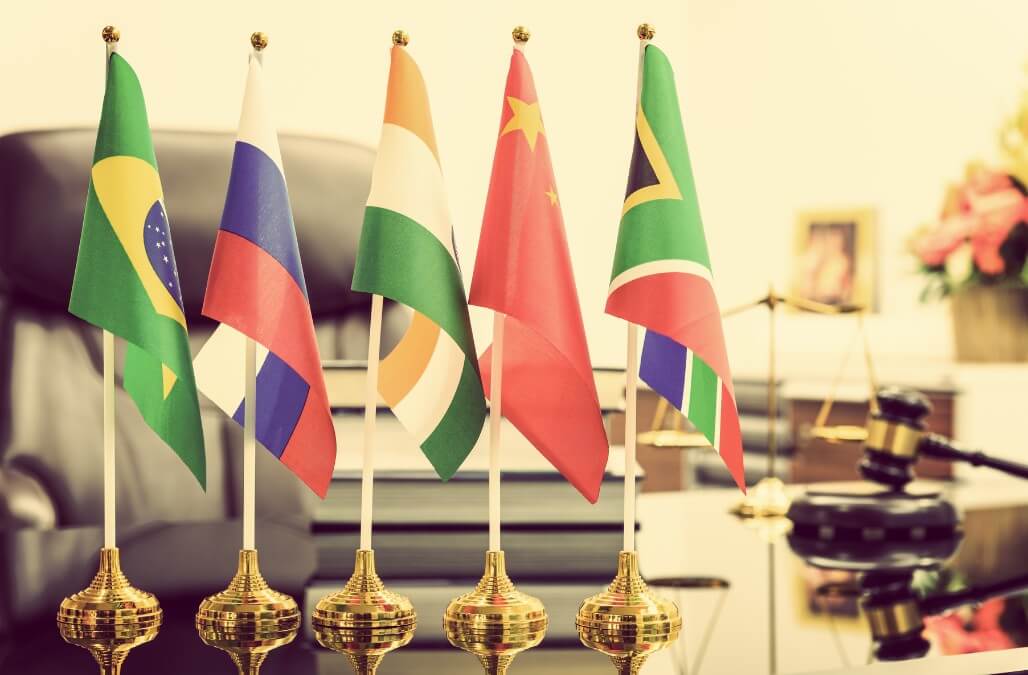China is looking to propel the BRICS coalition of emerging economies into a substantial contender against the G7. Leaders from various developing nations will convene to discuss the most extensive expansion the forum has witnessed in over ten years.
President Cyril Ramaphosa of South Africa has extended invitations to over 60 heads of state and government for a summit starting Wednesday in Johannesburg. Several countries might receive invitations during this event to join the coalition, which currently comprises Brazil, Russia, India, China, and South Africa, according to officials acquainted with the discussions.
China and India’s clash on BRICS’ alliance
As the summit approaches, there has been a clash between New Delhi and Beijing regarding expanding the BRICS coalition. The disagreement stems from differing viewpoints on whether BRICS should function as an impartial alliance aimed at the economic interests of developing nations or as a political entity openly challenging Western powers. Individuals familiar with India and China’s stances have noted increasing tensions. South African officials have disclosed that 23 nations are interested in joining the coalition.
A Chinese official, opting to remain anonymous, remarked that if they expand BRICS to encompass a comparable share of the global GDP as the G7, the collective influence on the international stage will strengthen. In contrast, Naledi Pandor, South Africa’s foreign minister, emphasized that perceiving a potential BRICS expansion as an anti-Western move is “extremely wrong.” Nonetheless, Western capitals are likely to interpret the potential inclusion of countries like Iran, Belarus, and Venezuela as a gesture to align with associates of Russia and China.
In the race to become the coalition’s first new members since South Africa’s induction in 2010, Argentina, Saudi Arabia, and Indonesia are actively competing for the position.
Brazil’s President Luiz Inácio Lula da Silva has recently advocated for extending BRICS membership to neighboring countries such as Argentina and Venezuela, Saudi Arabia and the United Arab Emirates. In Brasília, a senior diplomat wants to establish transparent criteria for any expansion. One potential requirement could be for new members to join the New Development Bank, headquartered in Shanghai and established by the BRICS. Notably, Saudi Arabia is discussing becoming the ninth member of this multilateral financial institution.
According to the diplomat, the likelihood of all 23 countries joining simultaneously seems remote; however, they must comprehend the rationale behind the decision. This understanding would apply to the current expansion and set a precedent for future enlargements.
Those overseeing the preliminary discussions before the summit have underlined that BRICS leaders must reach a consensus on the criteria for admitting new members. Contrary to a broader agenda of advocating for a common currency, which could counteract the dominance of the US dollar, such a topic is not on the table.
BRICS members attending the upcoming summit
On Monday, Xi Jinping, the President of China, is set to journey to Johannesburg for the summit and engagements with African leaders, as confirmed by China’s foreign ministry. The visit marks a rare instance of international travel for the Chinese president in 2023, with his prior overseas trip to Russia in March.
Meanwhile, President Vladimir Putin will not physically join other BRICS leaders in Johannesburg. This decision will relieve Pretoria from the obligation to execute the legal mandate of arresting the Russian leader, who faces indictment by the International Criminal Court due to the conflict in Ukraine. Putin is expected to participate through a video link. Notably, as reported by the Kremlin, he engaged in a conversation with Iran’s President Ebrahim Raisi on August 17 regarding Tehran’s bid to join the BRICS.
Meanwhile, rather than pushing for widespread de-dollarization, the summit may pursue an accord among BRICS members to trade using their local currencies.





